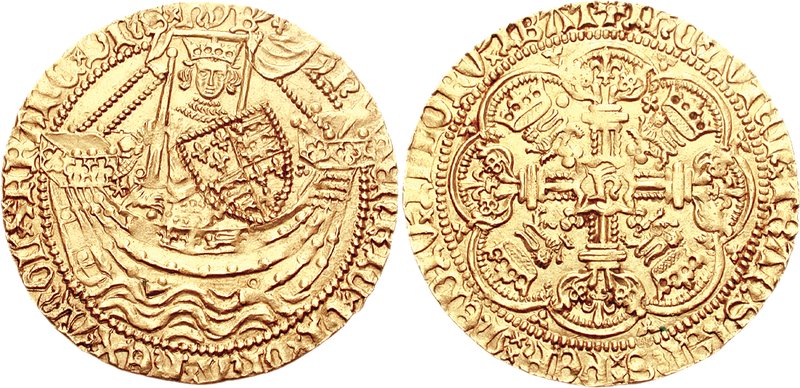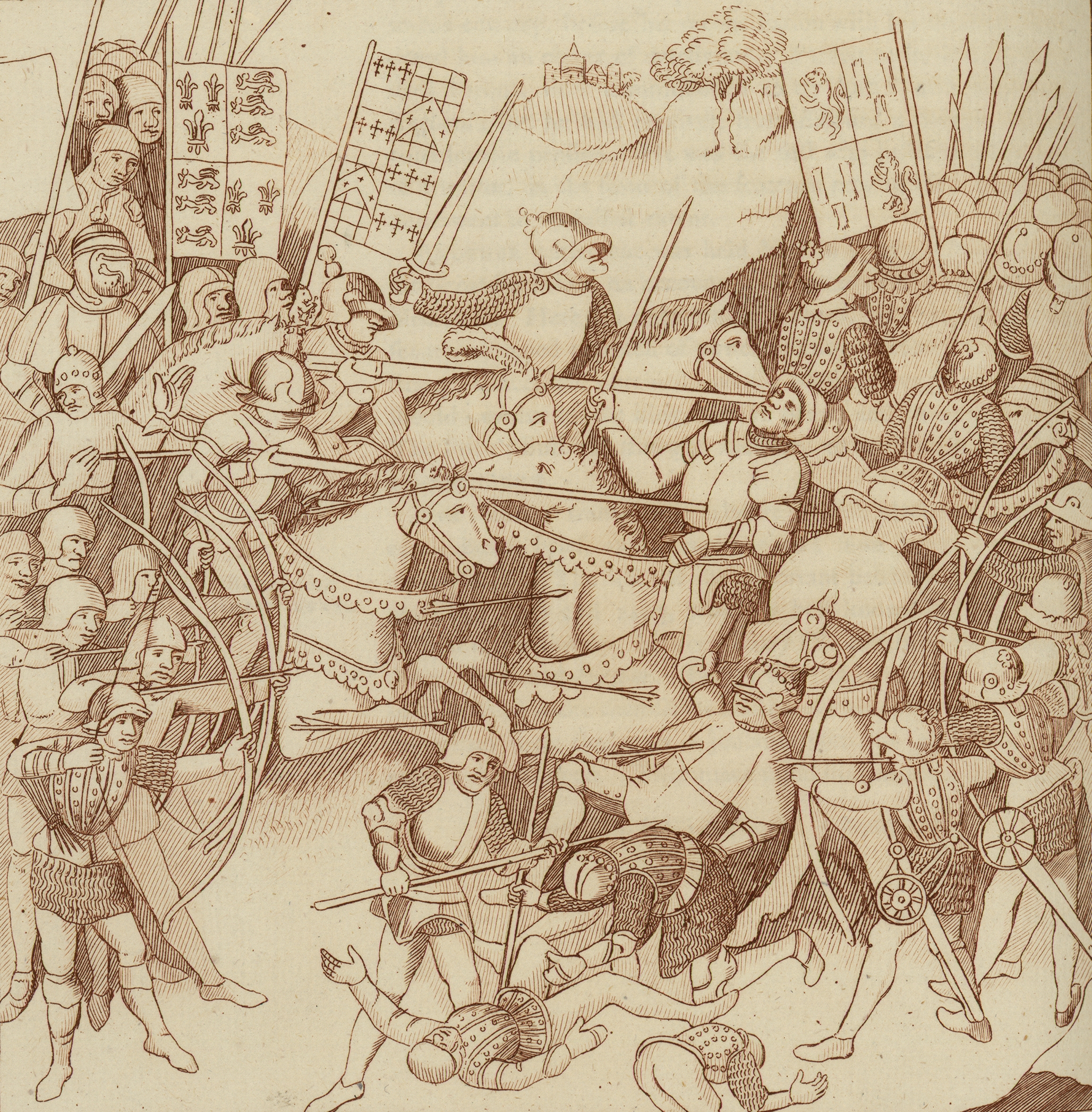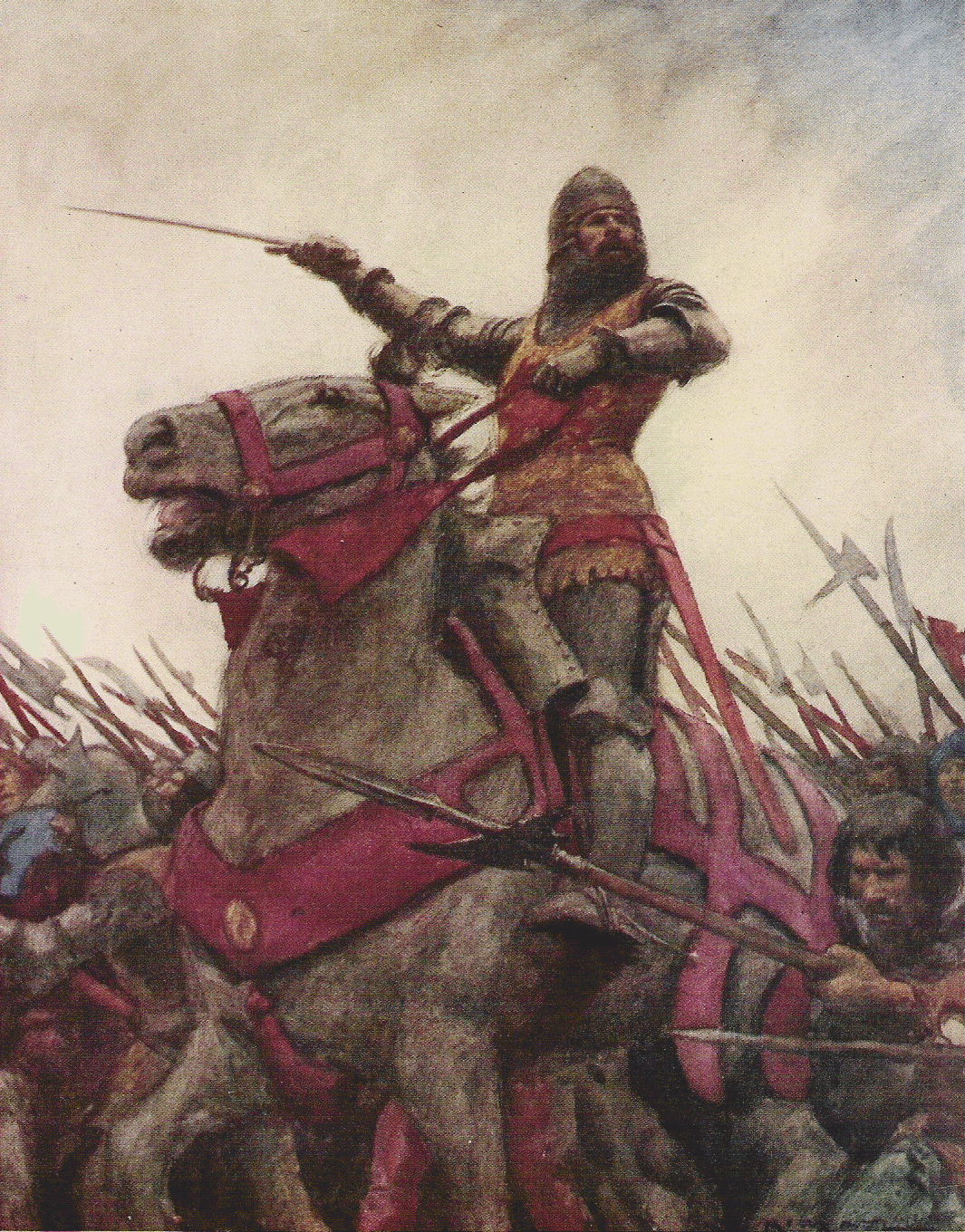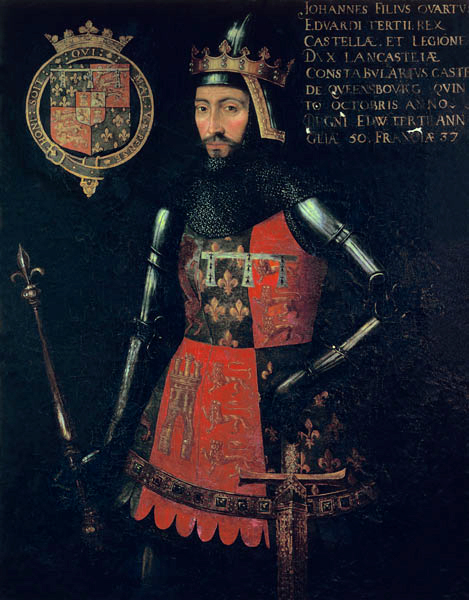|
Henry IV Of England
Henry IV ( – 20 March 1413), also known as Henry Bolingbroke, was King of England from 1399 to 1413. Henry was the son of John of Gaunt, Duke of Lancaster (a son of King Edward III), and Blanche of Lancaster. Henry was involved in the 1388 revolt of Lords Appellant against Richard II, his first cousin, but he was not punished. However, he was exiled from court in 1398. After Henry's father died in 1399, Richard blocked Henry's inheritance of his father's lands. That year, Henry rallied a group of supporters, overthrew and imprisoned Richard II, and usurped the throne; these actions later contributed to dynastic disputes in the Wars of the Roses (1455–1487). Henry was the first English ruler whose mother tongue was English (rather than French) since the Norman Conquest, over 300 years earlier. As king, he faced a number of rebellions, most seriously those of Owain Glyndŵr, the last Welshman to claim the title of Prince of Wales, and the English knight Henry Percy (Hotspur) ... [...More Info...] [...Related Items...] OR: [Wikipedia] [Google] [Baidu] |
Illuminated Miniature
A miniature (from the Latin verb 'to colour with Minium (pigment), minium', a red lead) is a small illustration used to decorate an ancient history, ancient or medieval illuminated manuscript; the simple illustrations of the early codex, codices having been miniated or delineated with that pigment. The generally small scale of such medieval pictures has led to etymological confusion with minuteness and to its application to small paintings, especially portrait miniatures, which did however grow from the same tradition and at least initially used similar techniques. Apart from the Western, Byzantine art, Byzantine and Armenian illuminated manuscripts, Armenian traditions, there is another group of Asian traditions, which is generally more illustrative in nature, and from origins in manuscript book decoration also developed into single-sheet small paintings to be kept in albums, which are also called miniatures, as the Western equivalents in Watercolor painting, watercolor and othe ... [...More Info...] [...Related Items...] OR: [Wikipedia] [Google] [Baidu] |
John Of Gaunt
John of Gaunt, Duke of Lancaster (6 March 1340 – 3 February 1399), was an English royal prince, military leader and statesman. He was the fourth son (third surviving) of King Edward III of England, and the father of King Henry IV. Because of Gaunt's royal origin, advantageous marriages and some generous land grants, he was one of the richest men of his era and an influential figure during the reigns of both his father and his nephew, Richard II. As Duke of Lancaster, he is the founder of the royal House of Lancaster, whose members would ascend the throne after his death. His birthplace, Ghent in Flanders, then known in English as ''Gaunt'', was the origin of his name. John's early career was spent in France and Spain fighting in the Hundred Years' War. He made an abortive attempt to enforce a claim to the Crown of Castile that came through his second wife, Constance of Castile, and for a time styled himself as King of Castile. When Edward the Black Prince, Gaunt's elde ... [...More Info...] [...Related Items...] OR: [Wikipedia] [Google] [Baidu] |
King Edward III
Edward III (13 November 1312 – 21 June 1377), also known as Edward of Windsor before his accession, was King of England from January 1327 until his death in 1377. He is noted for his military success and for restoring royal authority after the disastrous and unorthodox reign of his father, Edward II. Edward III transformed the Kingdom of England into one of the most formidable military powers in Europe. His fifty-year reign is one of the longest in English history, and saw vital developments in legislation and government, in particular the evolution of the English Parliament, as well as the ravages of the Black Death. He outlived his eldest son, Edward the Black Prince, and was succeeded by his grandson, Richard II. Edward was crowned at age fourteen after his father was deposed by his mother, Isabella of France, and her lover, Roger Mortimer. At the age of seventeen, he led a successful coup d'état against Mortimer, the '' de facto'' ruler of England, and began his per ... [...More Info...] [...Related Items...] OR: [Wikipedia] [Google] [Baidu] |
Lincolnshire
Lincolnshire (), abbreviated ''Lincs'', is a Ceremonial counties of England, ceremonial county in the East Midlands and Yorkshire and the Humber regions of England. It is bordered by the East Riding of Yorkshire across the Humber estuary to the north, the North Sea to the east, Norfolk, Cambridgeshire, Northamptonshire and Rutland to the south, and Leicestershire, Nottinghamshire and South Yorkshire to the west. The county is predominantly rural, with an area of and a population of 1,095,010. After Lincoln (104,565), the largest towns are Grimsby (85,911) and Scunthorpe (81,286). For Local government in England, local government purposes Lincolnshire comprises a non-metropolitan county with seven districts, and the unitary authority areas of North Lincolnshire and North East Lincolnshire. The last two areas are part of the Yorkshire and the Humber region, and the rest of the county is in the East Midlands. The non-metropolitan county council and two unitary councils collabora ... [...More Info...] [...Related Items...] OR: [Wikipedia] [Google] [Baidu] |
Henry Of Monmouth
Henry V (16 September 1386 – 31 August 1422), also called Henry of Monmouth, was King of England from 1413 until his death in 1422. Despite his relatively short reign, Henry's outstanding military successes in the Hundred Years' War against France made England one of the strongest military powers in Europe. Immortalised in Shakespeare's "Henriad" plays, Henry is known and celebrated as one of the greatest warrior-kings of medieval England. Henry of Monmouth, the eldest son of Henry IV, became heir apparent and Prince of Wales after his father seized the throne in 1399. During the reign of his father, the young Prince Henry gained military experience fighting the Welsh during the revolt of Owain Glyndŵr, and against the powerful Percy family of Northumberland. He played a central part at the Battle of Shrewsbury despite being just sixteen years of age. As he entered adulthood, Henry played an increasingly central role in England's government due to the declining health of h ... [...More Info...] [...Related Items...] OR: [Wikipedia] [Google] [Baidu] |
Battle Of Shrewsbury
The Battle of Shrewsbury was fought on 21 July 1403, waged between an army led by the Lancastrian King Henry IV and a rebel army led by Henry "Harry Hotspur" Percy from Northumberland. The battle, the first in which English archers fought each other on English soil, reaffirmed the effectiveness of the longbow and ended the Percy challenge to King Henry IV of England. Part of the fighting is believed to have taken place at what is now Battlefield, Shropshire, England, three miles (5 km) north of the centre of Shrewsbury. It is marked today by Battlefield Church and Battlefield Heritage Park. Background The Percys had previously supported Henry IV in a war against King Richard II of England, which ended when Henry IV took the throne in 1399. The Percys subsequently supported Henry IV in Wales, early in the rebellion of Owain Glyndŵr, and in Scotland, in both negotiations with and conflict against the Scots. King Henry IV had been supported by a number of wealthy land ... [...More Info...] [...Related Items...] OR: [Wikipedia] [Google] [Baidu] |
Henry Percy (Hotspur)
Sir Henry Percy (20 May 1364 – 21 July 1403), nicknamed Hotspur or Harry Hotspur, was an English knight who fought in several campaigns against the Scots in the northern border and against the French during the Hundred Years' War. The nickname "Hotspur" was given to him by the Scots as a tribute to his speed in advance and readiness to attack. The heir to a leading noble family in northern England, Hotspur was one of the earliest and prime movers behind the deposition of King Richard II in favour of Henry Bolingbroke in 1399. He later fell out with the new regime and rebelled, and was slain at the Battle of Shrewsbury in 1403 at the height of his fame. Career Henry Percy was born 20 May 1364 at either Alnwick Castle or Warkworth Castle in Northumberland, the eldest son of Henry Percy, 1st Earl of Northumberland, and Margaret Neville, daughter of Ralph de Neville, 2nd Lord Neville of Raby, and Alice de Audley.; . He was knighted by King Edward III in April ... [...More Info...] [...Related Items...] OR: [Wikipedia] [Google] [Baidu] |
Owain Glyndŵr
Owain ap Gruffydd (28 May 135420 September 1415), commonly known as Owain Glyndŵr (Glyn Dŵr, , anglicised as Owen Glendower) was a Welsh people, Welsh leader, soldier and military commander in the Wales in the late Middle Ages, late Middle Ages, who led a Glyndŵr rebellion, 15-year-long Welsh revolt with the aim of ending Kingdom of England, English rule in Wales. He was an educated lawyer, forming the first Welsh parliament under his rule, and was the last native-born Welshman to claim the title Prince of Wales. During the year 1400, Glyndŵr, a Welsh soldier and Glyndyfrdwy, Lord of Glyndyfrdwy had a dispute with a neighbouring Peerage of England, English Lord, the event which spiraled into a national revolt pitted common Welsh countrymen and nobles against the English military. In response to the rebellion, discriminatory Penal laws against the Welsh, penal laws were implemented against the Welsh people; this deepened civil unrest and significantly increased support for ... [...More Info...] [...Related Items...] OR: [Wikipedia] [Google] [Baidu] |
Norman Conquest
The Norman Conquest (or the Conquest) was the 11th-century invasion and occupation of England by an army made up of thousands of Normans, Norman, French people, French, Flemish people, Flemish, and Bretons, Breton troops, all led by the Duke of Normandy, later styled William the Conqueror. William's claim to the English throne derived from his familial relationship with the childless Anglo-Saxon king Edward the Confessor, who may have encouraged William's hopes for the throne. Edward died in January 1066 and was succeeded by his brother-in-law Harold Godwinson. The Norwegian king Harald Hardrada invaded northern England in September 1066 and was victorious at the Battle of Fulford on 20 September, but Godwinson's army defeated and killed Hardrada at the Battle of Stamford Bridge on 25 September. Three days later on 28 September, William's invasion force of thousands of men and hundreds of ships landed at Pevensey in Sussex in southern England. Harold marched south to oppose ... [...More Info...] [...Related Items...] OR: [Wikipedia] [Google] [Baidu] |
Wars Of The Roses
The Wars of the Roses, known at the time and in following centuries as the Civil Wars, were a series of armed confrontations, machinations, battles and campaigns fought over control of the English throne from 1455 to 1487. The conflict was fought between supporters of the House of Lancaster and House of York, two rival cadet branches of the royal House of Plantagenet. The conflict resulted in the end of Lancaster's male line in 1471, leaving the Tudors of Penmynydd, Tudor family to inherit their claim to the throne through the female line. Conflict was largely brought to an end upon the union of the two houses through marriage, creating the Tudor dynasty that would subsequently rule England. The Wars of the Roses were rooted in English socio-economic troubles caused by the Hundred Years' War (1337–1453) with France, as well as the quasi-military bastard feudalism resulting from the powerful duchies created by King Edward III. The mental instability of King Henry VI of Englan ... [...More Info...] [...Related Items...] OR: [Wikipedia] [Google] [Baidu] |
Usurped
A usurper is an illegitimate or controversial claimant to power, often but not always in a monarchy. In other words, one who takes the power of a country, city, or established region for oneself, without any formal or legal right to claim it as one's own. Usurpers can rise to power in a region by often unexpected physical force such as via a coup d'état, as well as through political influence and deceit. Etymology The word originally came from the Latin word ''usurpare'' (“to seize", "to take forcefully" or "to use”). Politics The Greeks had their own conception of what usurpers were, calling them tyrants. In the ancient Greek usage, a tyrant (''tyrannos''/''τύραννος'' in Greek) was an individual who rose to power via unconstitutional or illegitimate means, usually not being an heir to an existing throne. Such individuals were perceived negatively by political philosophers such as Socrates, Plato and Aristotle. Usurpers often try to legitimize their position by c ... [...More Info...] [...Related Items...] OR: [Wikipedia] [Google] [Baidu] |
Lords Appellant
The Lords Appellant were a group of nobles in the reign of Richard II of England, King Richard II, who, in 1388, sought to impeach five of the King's favourites in order to restrain what was seen as tyrannical and capricious rule. The word ''appellant'' — still used in modern English by attorneys — simply means '[one who is] appealing'. It is the older (Norman) French form of the present participle of the verb ''appeler'', the equivalent of the English 'to appeal'. The group was called the "Lords Appellant" because its members invoked a legal procedure called an "appeal" to begin prosecution: the favourites were charged under an "appeal of treason", a device borrowed from English civil law, which led to some procedural complications. Members There were originally three Lords Appellant: * Thomas of Woodstock, 1st Duke of Gloucester, Thomas of Woodstock, Duke of Gloucester, son of Edward III of England, Edward III and thus the king's uncle; * Richard FitzAlan, 4th Earl of Arund ... [...More Info...] [...Related Items...] OR: [Wikipedia] [Google] [Baidu] |







